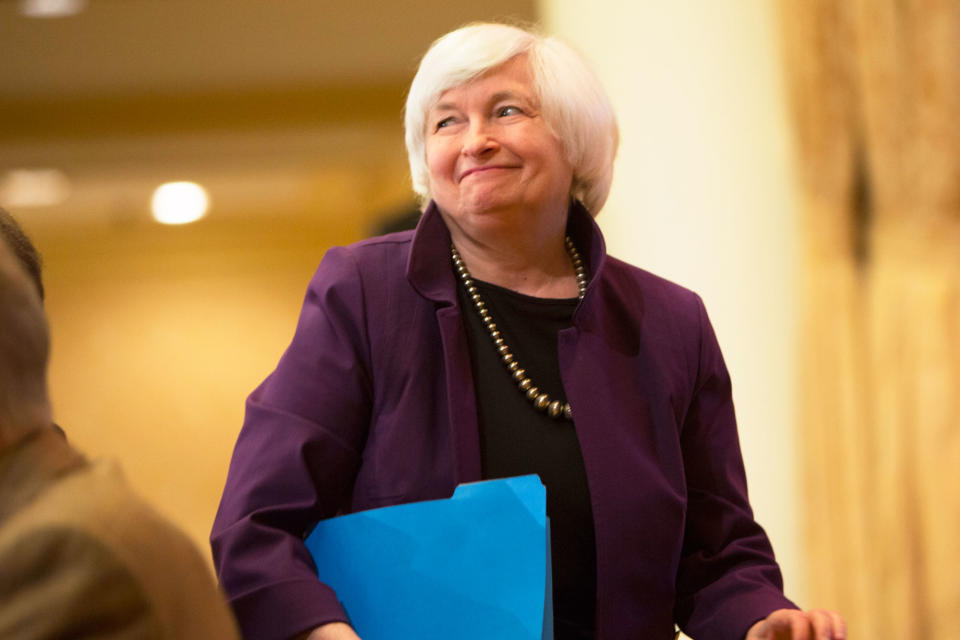Apple, Amazon, Google — What you need to know in markets on Thursday
The first day of February will bring investors one of the busiest news days we can remember.
After the market close, the tech sector will dominate with Apple (AAPL), Amazon (AMZN), and Goole parent company Alphabet (GOOGL) all reporting quarterly earnings.
Apple, the world’s largest publicly-traded company, will likely be the market’s biggest focus with reports in recent weeks indicating weak demand for its new flagship phone — iPhone X.
Amazon is also likely to face questions on its new headquarters while Alphabet should see analysts ask about how the company is handling its role as a platform and what content its search algorithms surface, particularly at its YouTube subsidiary.

Other notable earnings expected on Thursday include Time Warner (TWX), UPS (UPS), Visa (V), and Mastercard (MA).
On the economic calendar, January reports on manufacturing activity from Markit Economics and the Institute for Supply Management, as well as auto sales for January, worker productivity in the fourth quarter, and the weekly report on initial jobless claims.
Looking at the broader markets, investors are also coming off a bit of a see-saw session that saw stocks open higher and then sell-off after the Federal Reserve’s latest announcement while Treasury yields ran higher. These moves, however, reversed into the close with the major averages closing higher and Treasuries settling little-changed.
Markets on Thursday will also keep an eye on shares of Facebook (FB), which were down as much as 3% at one point in after hours trade Wednesday evening after the company announced slowing user growth and saying users spent less time in their News Feed during the fourth quarter.
The Federal Reserve will raise interest rates in March
Amid a busy week for markets and politics and earnings, you’d be forgiven, perhaps, for getting that the Federal Reserve announced their latest monetary policy decision on Wednesday afternoon.
The central bank announced it would keep its benchmark interest rate target range unchanged at 1.25%-1.5%, but clearly signaled that it will raise interest rates at its next policy meeting in March, writing in its statement that, “The Committee expects that economic conditions will evolve in a manner that will warrant further gradual increases in the federal funds rate.”
This is as plain as the Fed will ever be about its future plans.

Other notable developments from the Fed’s announcement were its contention that it expects inflation will move back towards its target, with the Fed writing that, “Inflation on a 12‑month basis is expected to move up this year and to stabilize around the Committee’s 2 percent objective over the medium term.”
“Janet Yellen’s final meeting as Fed Chair pretty much summed up her entire tenure,” said Michael Pearce, senior US economist at Capital Economics. “Policy was left accomodative but there were hints it will be tightened gradually in the future. The more hawkish statement confirms expectations of a March hike and we expect the Fed to raise rates four times in 2018.”
Rick Rieder, BlackRock’s Chief Investment Officer of Global Fixed Income, said Wednesday’s statement “served to upgrade the Fed’s perception and interpretation of the current rate of inflation.”
Following the Fed’s statement, Treasury yields moved higher with the 10-year hitting 2.75% before settling closer to 2.7%, a sign that markets now see a more aggressive Fed coming in the year ahead.
Additionally, Wednesday’s announcement was the last made under outgoing Fed chair Janet Yellen, who will be replaced by Jerome Powell in early February.
So with a personnel and economic outlook transition coming to a central bank that has laid out a clear set of instructions for investors over the last couple years, it seems likely that monitoring the Fed will become a bigger part of the market conversation in 2018 and in the years ahead.
—
Myles Udland is a writer at Yahoo Finance. Follow him on Twitter @MylesUdland
Read more from Myles here:
One candidate for Amazon’s next headquarters looks like a clear frontrunner
Tax cuts are going to keep being a boon for the shareholder class
Auto sales declined for the first time since the financial crisis in 2017
Foreign investors might be the key to forecasting a U.S. recession
It’s been 17 years since U.S. consumers felt this good about the economy


